The heresy of heat and cold deaths
A group of campaign researchers try hilariously, ineptly — and depressingly —to suppress facts
TL;DR. A blog, claiming to check facts, does not like I cite this fact: the rising temperatures in the past two decades have caused more heat deaths, but at the same time avoided even more cold deaths. Since this inconvenient fact is true, they ignore to check it. Instead, they fabricate an absurd quote, which is contradicted in the very article they claim to 'fact-check'.
166,000 avoided deaths
Cold deaths vastly outweigh heat deaths. This is common knowledge in the academic literature and for instance the Lancet finds that each year, almost 600,000 people die globally from heat but 4.5 million from cold.
Moreover, when the researchers include increasing temperatures of 0.26°C/decade (0.47°F/decade), they find heat deaths increase, but cold deaths decrease more than twice as much:

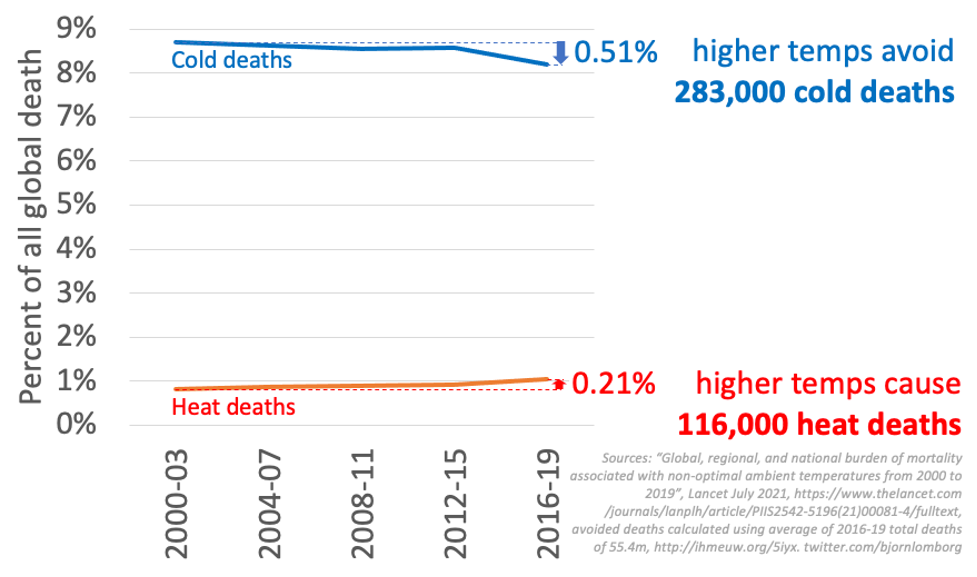
Or here from the article:

The total impact of more than 116,000 more heat deaths each year and almost 283,000 fewer cold deaths year is that by now, the temperature rise since 2000 means that for temperature-related mortality we are seeing 166,000 fewer deaths each year.
Climate Feedback
However, this is obviously heretical information, so the self-appointed blog, Climate Feedback, wants it purged. Now, if they were just green campaigning academics writing on the internet, that might not matter much. But unfortunately, this group has gained the opportunity to censor information on Facebook, so I have to spend some time showing you their inept, often hilarious, and mostly nefarious arguments. The group regularly makes these sorts of bad-faith arguments, and apparently appealing their Facebook inditements simply goes back to the same group. It is rarely swayed by any argument.
They never test the claim
Climate Feedback seemingly wants to test my central claim from the Lancet article that global warming now saves 166,000 people each year, from my oped in New York Post:
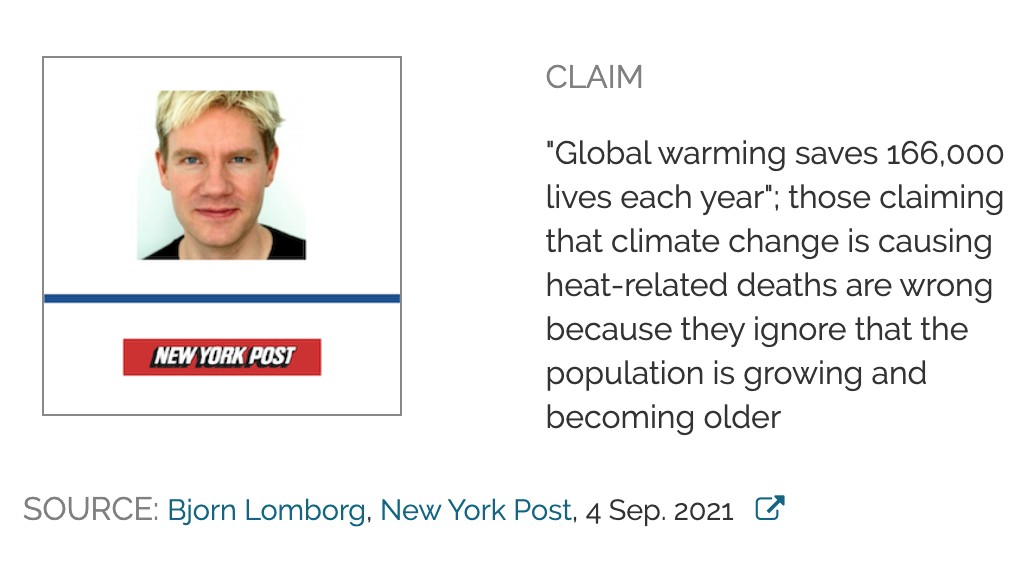
But notice what is happening right after the quote “Global warming saves 166,000 lives each year”. They append it with something that is not in the New York Post. You have to read much further to realize that they are actually trying — and failing — to paste in an entirely separate Facebook post, which addressed a different scientific article.
It turns out, Climate Feedback never addresses the 166,000 people saved in their main text. “166” only occurs three times in the article: twice stating my claim and once after their main text in a diatribe by an ocean-physics professor, complete with personal insults. In it, the professor doesn’t contest the 166,000 avoided deaths. Instead, he falsely claims that I am presenting the 166,000 as the overall mortality impact of climate change, which is absurd: anyone reading my piece understand that I’m talking about the impact of temperature-related mortality.
Perhaps most tellingly, Climate Feedback has asked one of the co-authors of the 166,000 Lancet study (as they also very proudly declare in their text). And this professor, Antonio Gasparrini, does not only not challenge but doesn’t even discuss my analysis of the 166,000 avoided deaths.
Climate Feedback not only doesn’t present any reasonable argument against the 166,000 avoided deaths. It has actually asked one of the main authors of the study to comment and they have nothing.
In conclusion, Climate Feedback simply has no good arguments against the 166,000 people saved, and yet they pillory my work publicly in an attempt to censor data they deem inconvenient. . That academics play along in this charade of an inquisition dressed up ‘fact-check’ is despicable.
Rest of Climate Feedback’s claim is ludicrously wrong
So, beyond the claim of 166,000, Climate Feedback is alleging that I say the following: “those claiming that climate change is causing heat-related deaths are wrong because they ignore that the population is growing and becoming older.”

This is a fabricated quote. I never say this. Climate Feedback has simply made up a false statement, dressing it as a quote of mine, even though I never claimed anything like this. This is incredibly deceptive: it is ludicrous to insist that I should argue that it is wrong to claim “climate change is causing heat-related deaths.” I simply do not argue that “climate change is not causing heat-related deaths”
Up above I exactly argued that climate change causes more heat deaths. My graph shows that climate change causes more heat deaths.
And I even point out exactly that the temperature increases cause heat deaths in my New York Post piece:
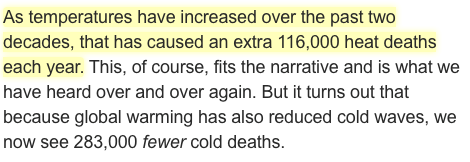
“As temperatures have increased over the past two decades, that has caused an extra 116,000 heat deaths each year.” Sorry, Climate Feedback, but the rest of your claim is straight-out, full-on stupid.
Evaluation of Climate Feedback’s review
So Climate Feedback is simply wrong in asserting that I somehow say climate change is not causing heat-related deaths — because I do say that, even in my New York Post article:
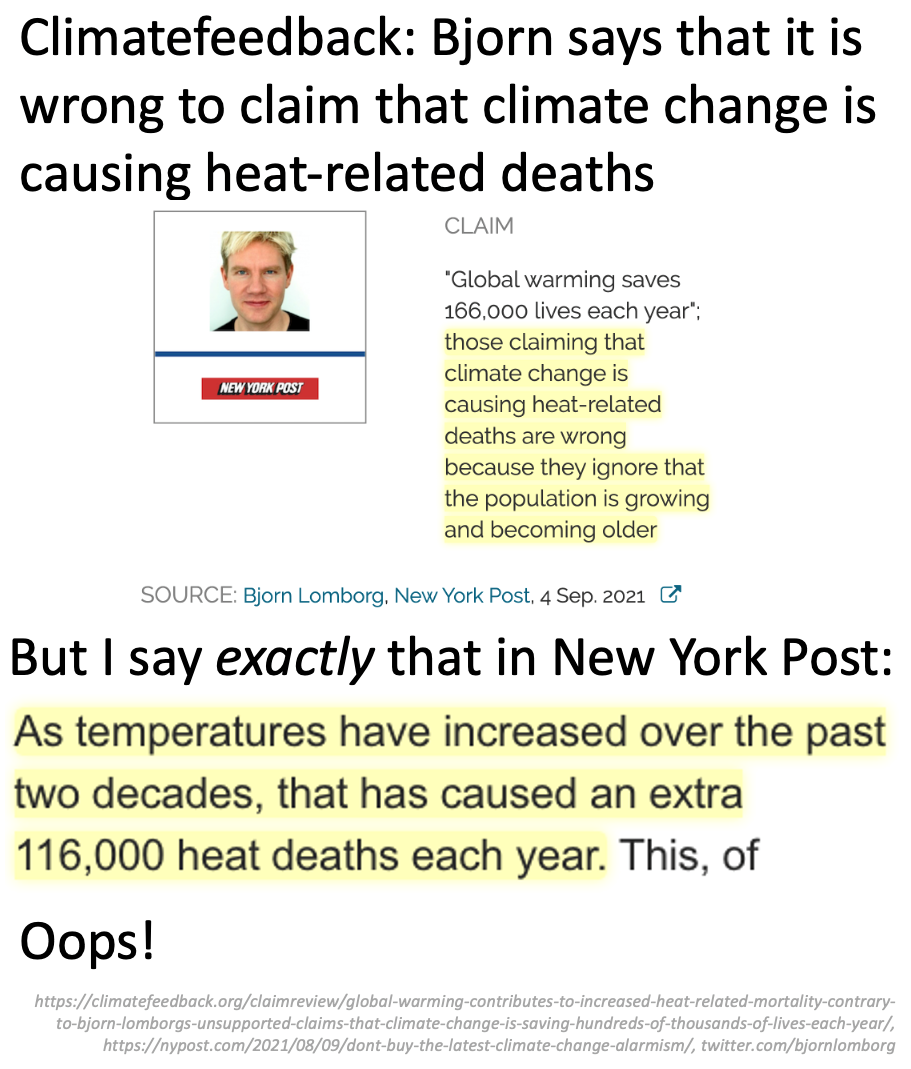
Climate Feedback doesn’t show anywhere in their main text how the 166,000 avoided deaths are wrong. They even ask one of the main authors of the study, and that professor says nothing.
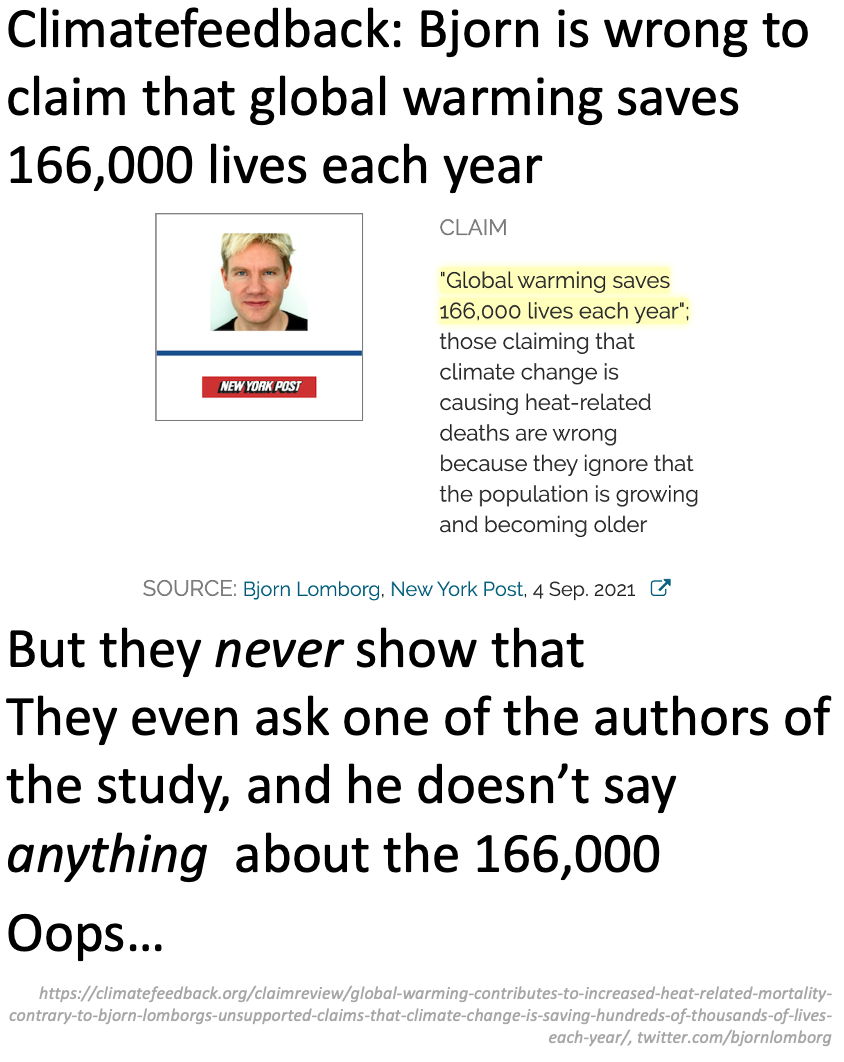
Conclusion
Climate Feedback’s deceptive hit job is long on innuendo and bad arguments (see a few, further examples below). But the proof really is in the pudding.
They make two central arguments. First, that my claim of “Global warming saves 166,000 lives each year" is incorrect. Yet, they never address this in their main text. And while they get information from one of the main authors of the Lancet study that is the basis for the 166,000 lives saved, they get no criticism of the argument.
Second, they assert that I somehow say that it is wrong to claim climate change is causing more heat-related deaths, which is just ludicrous because I make that very point, even in my New York Post article:
Verdict: Climate Feedback is fundamentally wrong in both their two main claims.
Additional point: It really shouldn’t be necessary to say, but you can’t make a ‘fact-check’ page, write page after page of diatribe, ignore the first main point and bungle the other main point, and then hope at the end nobody notices, and call my arguments wrong. Or, at least, you shouldn’t be able to get away with such nonsense.
Two examples of the inadequate arguments in the rest of Climatefeedback
Lomborg doesn’t have a time machine
Climate Feedback asks professor Gasparrini, co-author of the Lancet study above. He doesn’t cover anything on the 166,000 deaths avoided. Instead, his text entirely discusses a 2016 WSJ article where I used his 2015-article but he criticizes me for not citing his 2017 article:
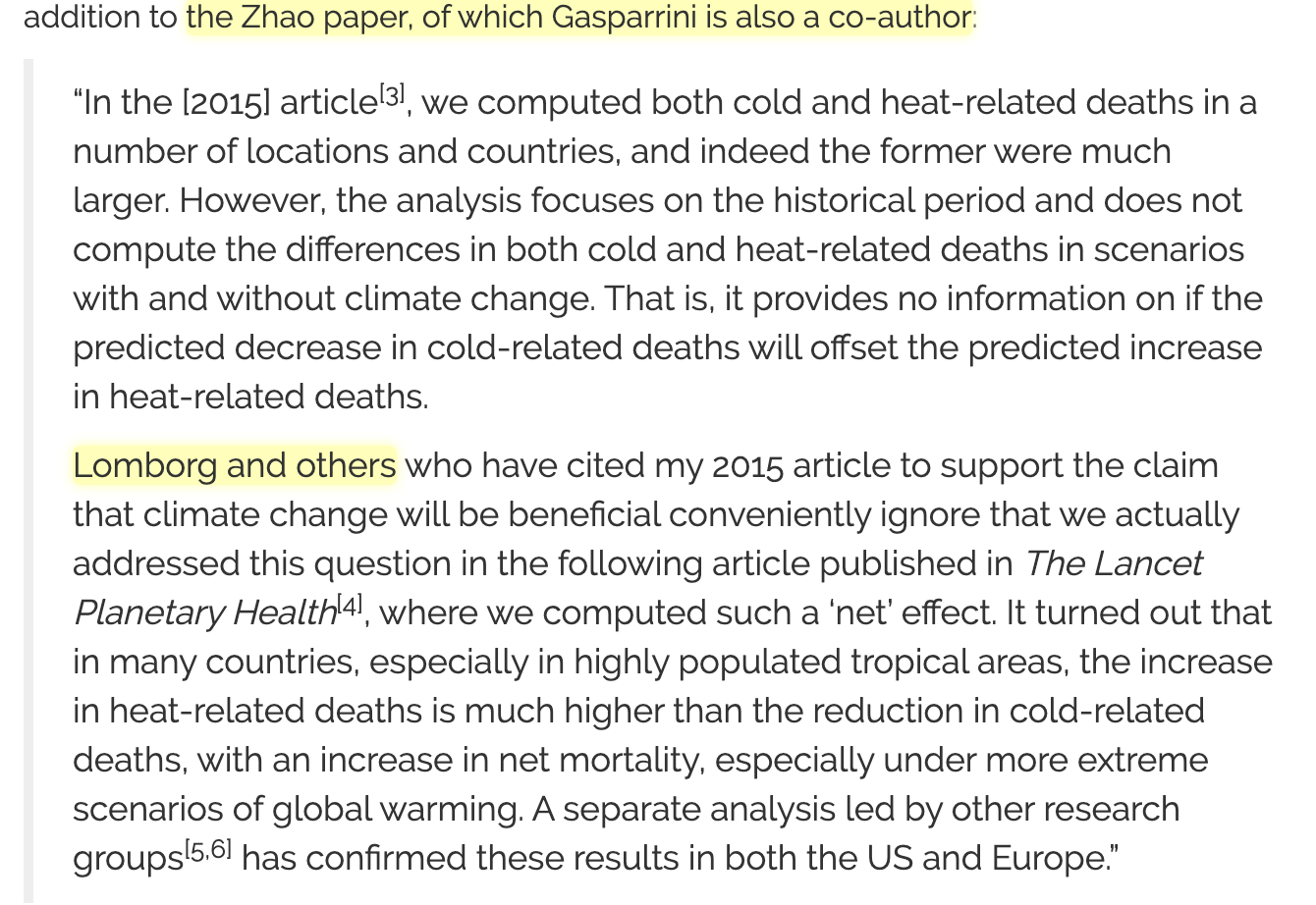
The reason I didn’t cite his 2017-article is of course that I didn’t have access to a time machine when I wrote my article in 2016.
Indeed, I have corresponded with Professor Gasparrini several times later about his 2017-article. And yes, his 2017-study indeed shows that at very high emissions, additional heat deaths will likely outweigh avoided cold deaths towards the end of the century. But his study also shows that all regions see additional heat deaths vastly exceeded by extra avoided cold deaths from the 1990s to the 2010s — the exact point I’ve made here.
Serious academics take into account population growth and aging
In a refreshing comment, Climate Feedback asks Philip Staddon, Principal Lecturer in Environment and Sustainability from the University of Gloucestershire to chime in. He says, that I’m wrong to criticize the lack of standardization from population growth and aging, because clearly “all serious academic research already takes account of population growth, demographics and ageing”:

I, of course, entirely agree with Staddon, that all serious academic research should do that. But the research that I have criticized has exactly not done so, resulting in unsupported claims. So, for instance, in the Facebook post that Climate Feedback discusses, I show how CNN believes that a study shows a 74% increase caused by the climate crisis:

This is based on not adjusting for population and age, and is actually from the press release of the paper (and in table S6 in the paper).
Likewise, Staddon might have noticed that a very high-profile editorial in the world’s top medical journals made that very amateurish mistake. They argue that temperature increases over the past 20 years have increased deaths among people 65 and older:

But they cite numbers that are not adjusted for age or population — indeed the world’s population of people above age 65 has increased almost as much:
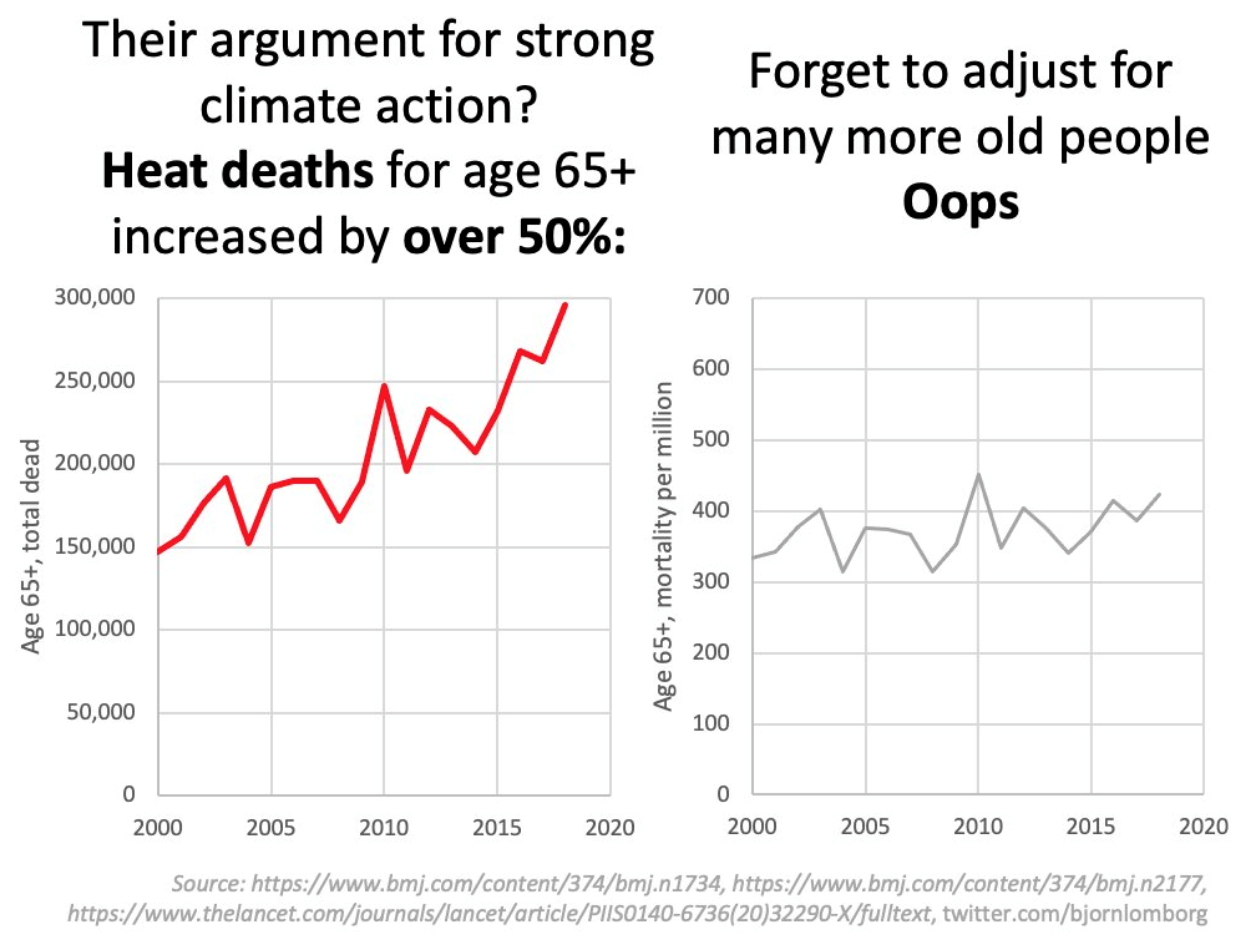
I absolutely agree with Principal Lecturer Philip Staddon on the necessity of making sure that good arguments in the public sphere are adjusted for population and aging before blaming climate. Unfortunately, they often aren’t